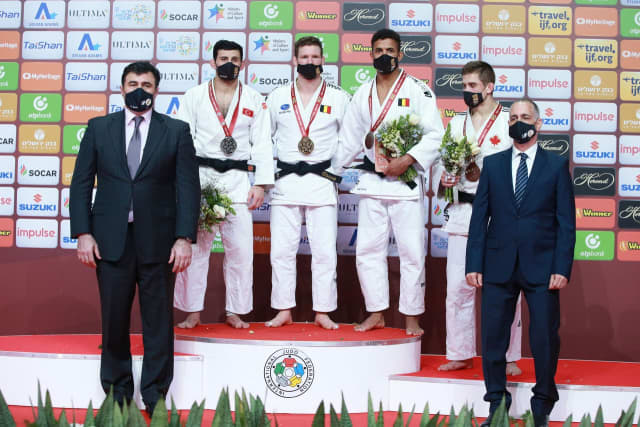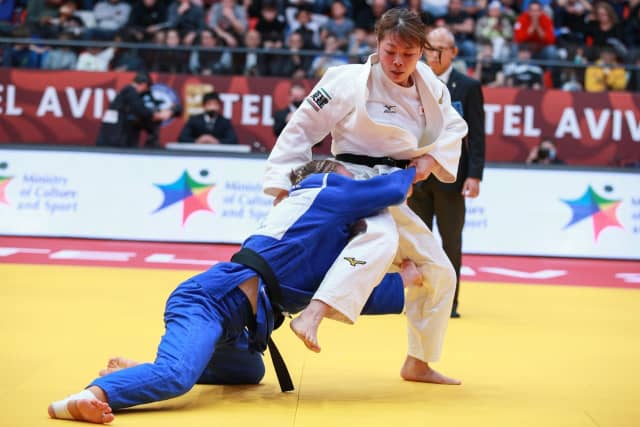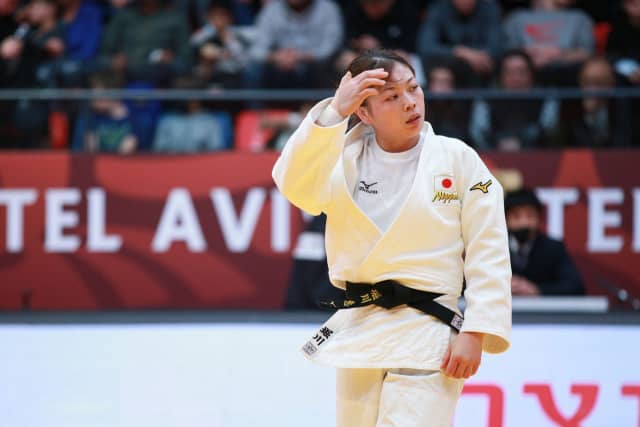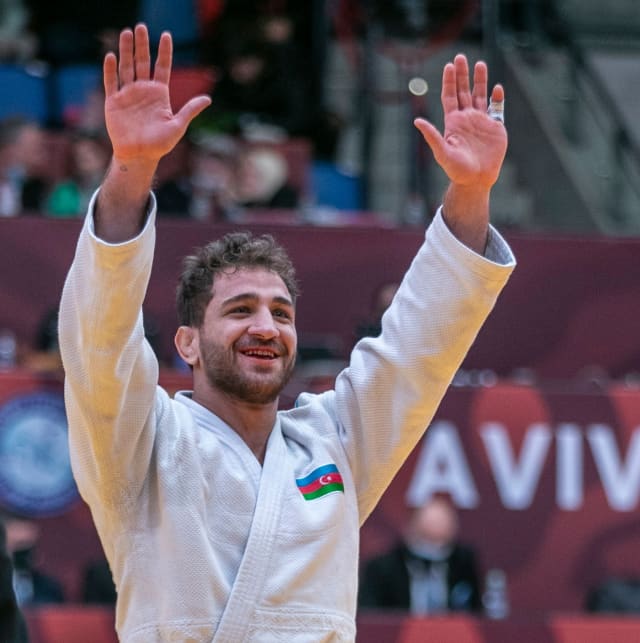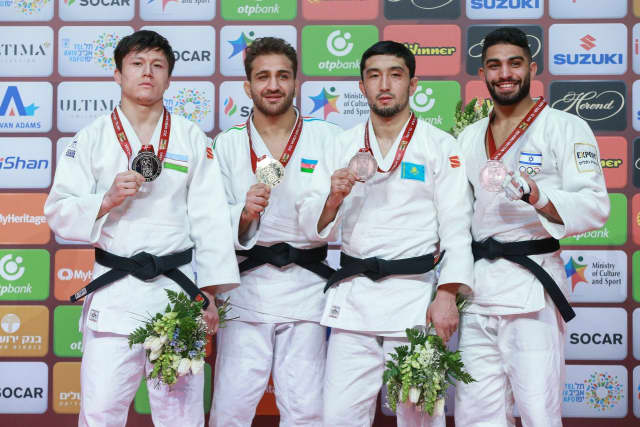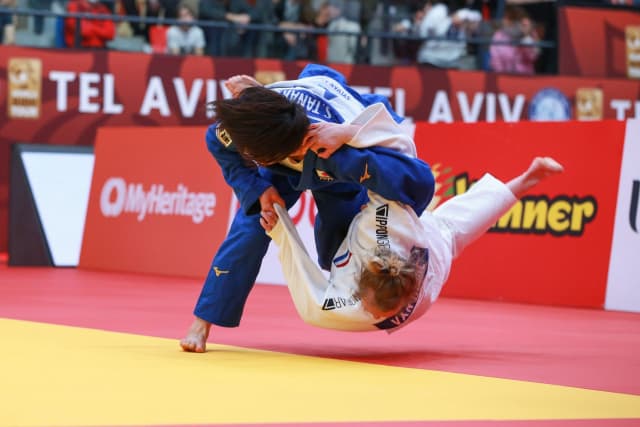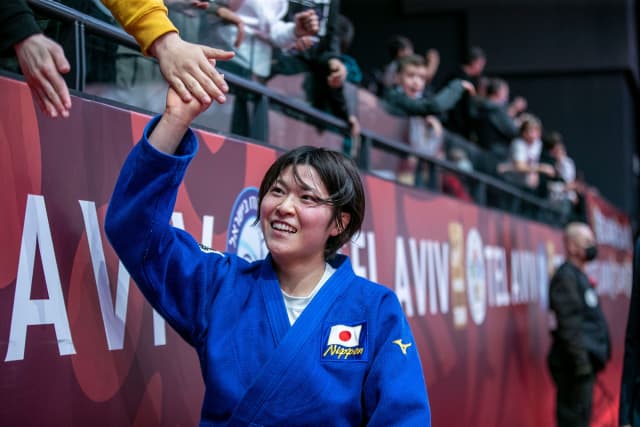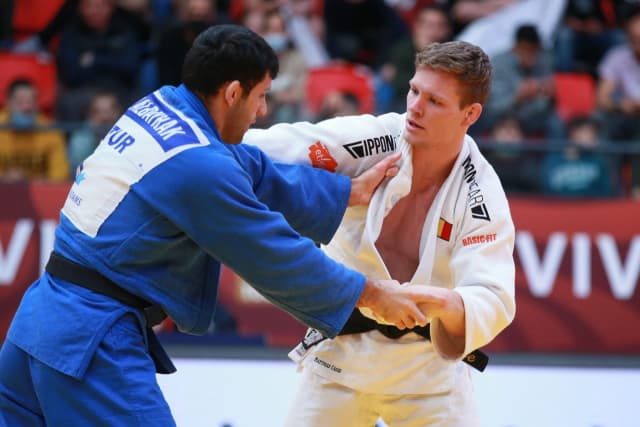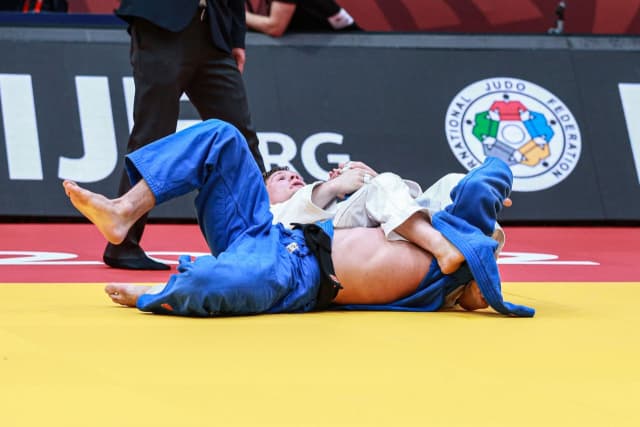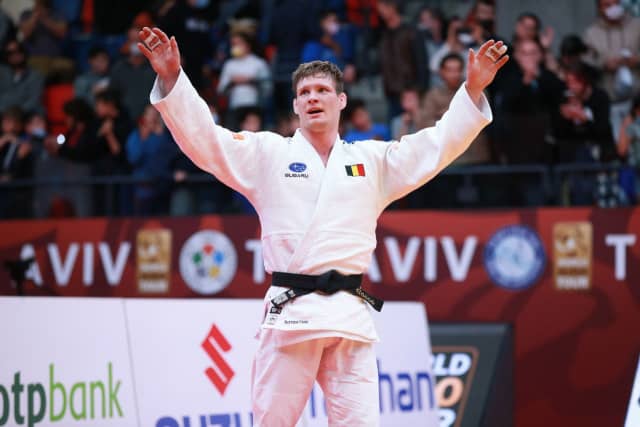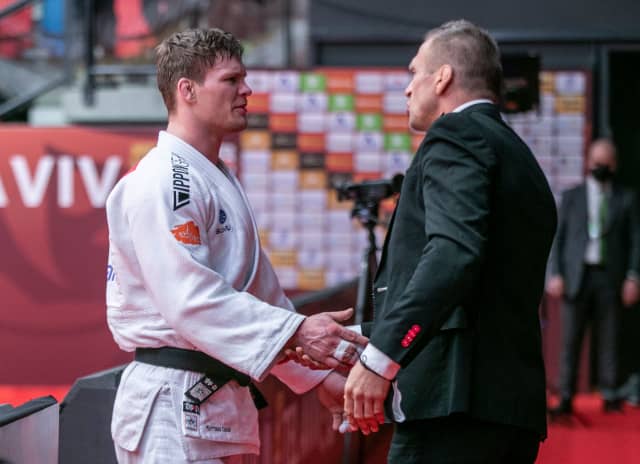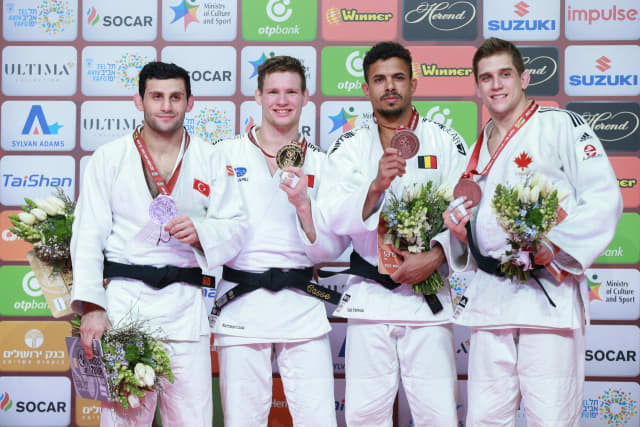Obviously, they came in large numbers to support their national heroes, including the 2019 world champion, Sagi Muki. It was sad not to find him in the final but they were still able to rejoice at seeing him gradually regain his best level. There is still a lot of work to be done but the signs are encouraging in an -81kg category that continues to produce very special champions.
Note that even when the Japanese come with a small team, 4 female athletes only, in this case, their judoka are always dangerous and are never far from the podium. On another note, after two days of competition, we can already see the interest in being at the top of the World Ranking List, but we also see new faces, ready to be talked about in the years to come.
With two gold medals today, Japan has jumped up to second place on the medal table and is chasing France for the top spot.
Women's -63kg: Megumi Horikawa Wins First Gold for Japan
Probably not the most famous Japanese athlete, Megumi Horikawa found herself in the final of the category after having eliminated all her opponents during the first phase of competition. She’s the winner of a previous grand slam, but it was in 2012 in Tokyo, ten years ago already. She has proven today that she is still competitive. In the final she faced Gemma Howell (GBR), who for the first time in her career gave herself the opportunity to win a grand slam gold.
The least we can say is that both Horikawa and Howell put all their heart into the match to win the gold. A lot of power was involved but still they could not score and had to face the shido rule: two for Horikawa, three for Howell. So the gold went to Japan.
In the first match for a bronze medal, we found the young Szofi Ozbas (HUN), Youth Olympic Champion a few years ago and junior world champion in 2019; she continues to progress in the seniors. In front of her was Nadia Simeoli (ITA), for the first time present in a final block of an event on the world circuit. In less than thirty seconds, Ozbas took a strong lead with a cleverly executed o-uchi-gari. Then Simeoli started to increase the pace and attacked non-stop. The main issue was that all attacks were coming from too far away and were too visible. Anyway, that strategy paid off as Ozbas was penalised with a first shido but that was not enough. A few seconds before the end of the match, the Hungarian competitor scored a second waza-ari, which was eventually downgraded to no score, based on the 90° rule. Despite all those twists and turns, Ozbas could finally enjoy her second bronze medal from a grand slam. She is becoming more and more solid and we'll have to count on her in the future.
After a career full of promise, Manon Deketer (FRA), eliminated in the semi-finals, was opposed by a bronze medallist of the Tokyo Games, Catherine Beauchemin-Pinard (CAN). Not afraid to face the Olympic medallist, the French woman took her chance and delivered a serious match until the last minute when she executed an armlock beautifully, giving no chance to Beauchemin-Pinard, who had to tap. After her bronze medal in Paris two weeks ago, this is a very good result for the 23 year old Deketer.
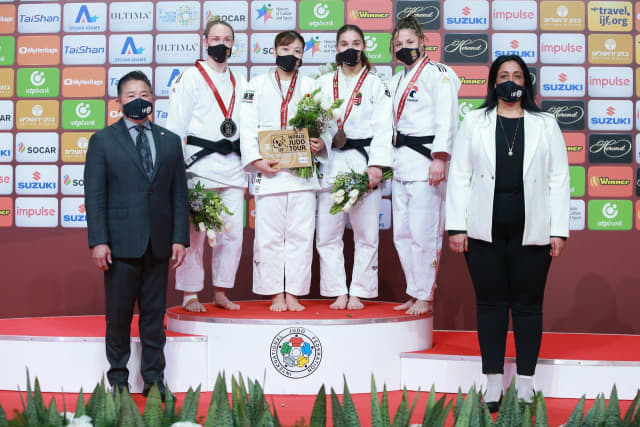
Final (-63 kg)
Bronze Medal Fights (-63 kg)
Final Results (-63 kg)
Men's -73kg: Welcome Back Hidayat Heydarov
As the top seed, Hidayat Heydarov had a good chance to qualify for the final and he did not miss the call, although the matches were sometimes tense. In the other half of the draw, due to the last minute absence of Rustam Orujov, the path was open for an underdog. Obidkhon Nomonov, coached by legend Ilias Iliadis, did not fail to step into the breach and also qualified brilliantly to face the Azeri for the gold medal.
You recognise a public of connoisseurs when they cheer for good techniques wherever they come from. A good judo move is a good judo move. The first roar coming from the stands was when Nomonov was close to scoring with an aerial uchi-mata but Heydarov escaped miraculously. Just before the end of regular time, the Uzbek was again very close to scoring but it was the golden score period that the athletes needed, entered with only one shido apiece, to decide the match. At 1:16 into extra time, Heydarov executed a spectacular koshi-guruma for a waza-ari that was worth the gold medal. The last time the Azeri champion won gold in a grand slam was in 2019. Welcome back Heydarov!
Igor Wandtke (GER), who was a bronze madallist at the 2021 World Judo Masters and Zhansay Smagulov (KAZ) three time grand prix gold medallist, faced each other in the first match for a bronze medal. Just before the end of the match, the German judoka was penalised a third time, giving the medal to Zhansay Smagulov, his third medal at a grand slam.
Cadet world champion in 2015, Giovanni Esposito (ITA) is now well established in the senior division but had a hard fight ahead of him to get the bronze, against local athlete Tohar Butbul (ISR), encouraged loudly by his home crowd. At half-time Butbul was leading by a waza-ari under the hurrahs of the public but Giovanni Esposito was putting incredible pressure on his opponent, who was penalised twice and was happy that eventually the gong echoed in the venue, rapidly covered by the audience’s explosion of joy. This is medal number 6 for Butbul in a grand slam.
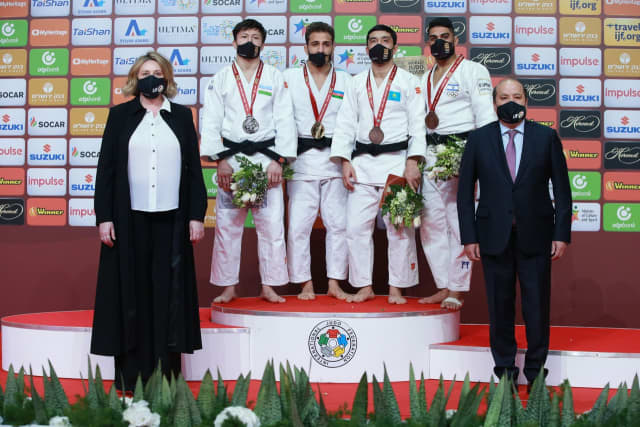
Final (-73 kg)
Bronze Medal Fights (-73 kg)
Final Results (-73 kg)
Women's -70kg: With Tanaka Japan Takes a Second Gold
Sanne Van Dijke (NED) was another favourite of the competition who didn't fail to reach the final, after she defeated former world champion from France, Marie Eve Gahie, who is still struggling to get back to her best form. To face the Dutch athlete was the Japanese judoka Shiho Tanaka, who, earlier in the competition, defeated the winner of the most recent Paris Grand Slam, Margaux Pinot.
After a pretty balanced final, thirty seconds from the end Shiho Tanaka executed an uchi-mata in traditional style to score waza-ari and win the second gold medal for her delegation.
The first bronze medal contest saw Marie Eve Gahie competing against Aoife Coughlan (AUS), who showed some good skill during the preliminaries but was lacking finesse to pass more rounds. Immediately, Gahie showed her power and executed the most dangerous technique but clearly she was missing the finish to be able to score. It was enough to force her opponent to be penalised though, which she was twice. Just before the end, Gahie pinned Coughlan but once again could not conclude. It was time for golden score. It was not that Coughlan didn't try but Gahie was definitely physically stronger. As she couldn't score, the final result depended on the third penalty which was not long in the making for the Australian. This is medal number seven in a grand slam for Gahie.
In the second bronze medal contest Michaela Polleres (AUT) faced Kelly Petersen Pollard (GBR). Halfway through, Petersen Pollard scored a first waza-ari with a koshi-waza technique. In fact, Michaela Polleres could have avoided it but by staying behind her opponent she was thrown. Then Petersen Pollard held her advantage until the end to win her third bronze medal in a grand slam.
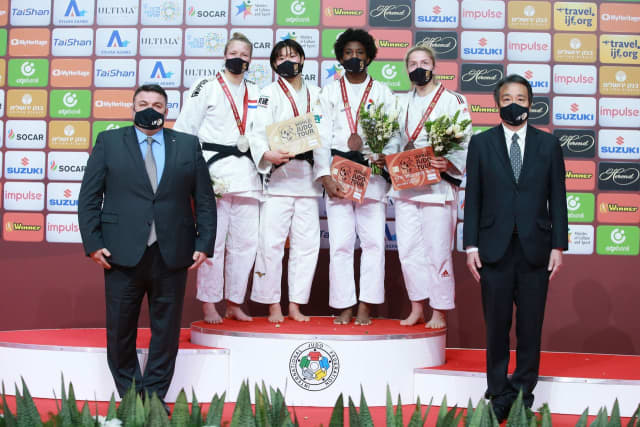
Final (-70 kg)
Bronze Medal Fights (-70 kg)
Final Results (-70 kg)
Men's -81kg: World Champion Casse Tops the Medal Podium
The hierarchy was perfectly respected at -81kg where the two top seeds, the reigning world champion and world number two Matthias Casse (BEL) and Vedat Albayrak (TUR), fifth in the world and winner of the Baku Grand Slam last year, found themselves in the final of a particularly tough category. It is interesting to note that this final is the third meeting between the two men and corresponds to the final of the 2021 European Championships, which saw the victory of the Turkish athlete. It was 2-0 for Albayrak before this Tel Aviv Grand Slam.
In his powerful and stable style, with his seoi-nage or his sumtemi-waza, Casse passed the elimination phases without really putting himself in danger. Master of his nerves, he tired all his opponents one by one to again reach the final of an event on the circuit, demonstrating his great consistency at this level.
Speaking of power, that of Vedat Albayrak also performed miracles from the beginning of the tournament, until the semi-finals where he found himself opposed to the 2019 world champion and national star, Sagi Muki. The Israeli is in a phase of returning to competition and obviously he has not yet regained the full capacity of his talent. He had a lot to do in the early matches and was sometimes put in danger, but was always victorious in the end, except in the semi-final, where he was pinned down by Vedat Albayrak.
It was a tense final, with two of the strongest men of the moment in the category. There was no big throw but a lot of very interesting kumi-kata. What is important is that after almost four minutes of golden score, Matthias Casse, who was maybe a little fresher than his opponent, concluded with a unique style of juji-gatame for ippon, concluding a great day of judo.
There was an interesting contest between Sami Chouchi (BEL) and Sagi Muki for the first bronze medal. After only 17 seconds both athletes were penalised with a shido for avoiding gripping and a little later Chouchi received a second shido, putting him in a difficult situation as in front of him he had Sagi Muki who was fully supported by his public. Golden score! Things seemed to be in good hands with Sagi Muki, when suddenly Chouchi dropped under the centre of gravity of his opponent with a yoko-guruma that totally surprised Muki and left him flat on his back. It’s a hard time for the champion, but the public continued to support Muki and Chouchi, with the two men delivering a beautiful moment of sportsmanship.
In the match for the second bronze medal, François Gauthier Drapeau (CAN) was opposed by Shamil Borchashvili (AUT). After almost four minutes of golden score, François Gauthier Drapeau won his second grand slam medal with a ko-uchi-gari that he combined with a tani-otoshi as he passed behind the his opponent. It was beautifully executed.
